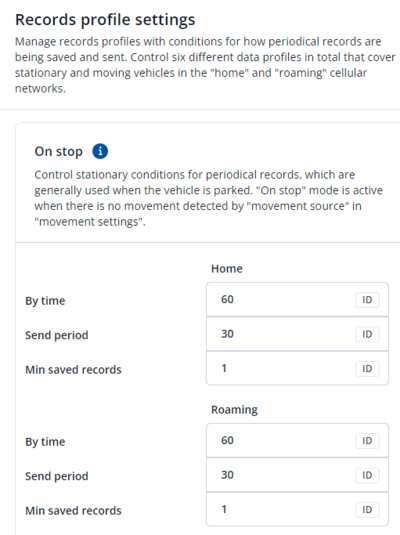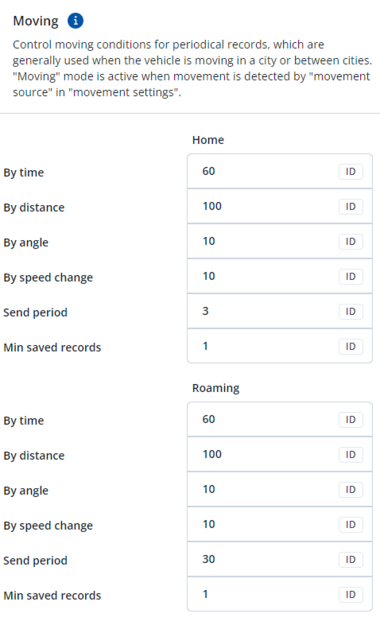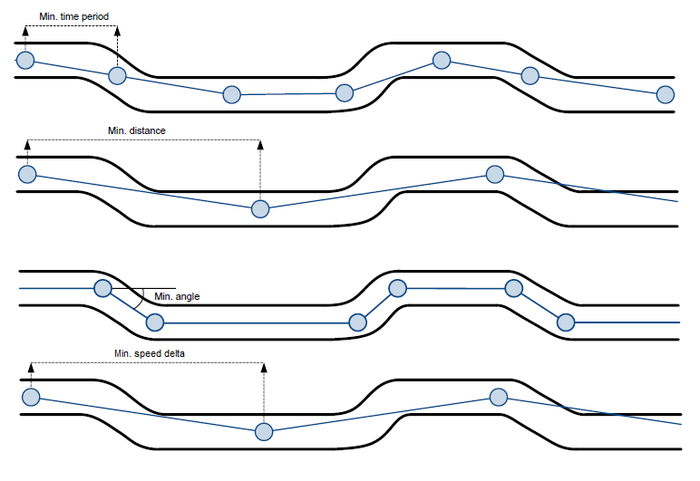FTC921 Tracking settings
Records settings

Saving/sending mode
This feature will be used to save and send records to the server without time synchronization.
Possible options:
After Position Fix - records will be saved and sent only after position fix.
After Time Sync - records will be saved and sent only after time synchronization.
Always - records will always be saved and sent even if there is no time synchronization.
Note: If the record is without valid coordinates – (there were no GPS fix at the moment of data acquisition) – Longitude, Latitude and Altitude values are sent as per the last valid fix, and Angle, Satellites and Speed will be 0. However, if there is a reboot then it will send zero coordinates.
Sort by
Can be set as either Newest or Oldest. For example, if the Oldest is marked, the device first will send the Oldest information, and if the Newest is marked, the device will send the newest information. Suppose the device had no connection (GSM or GPRS) due to bad coverage or being in an area with no signal, the device continues to save records into internal memory, and once GSM and GPRS are recovered, the device will start sending saved data to the server. In this example, if Oldest is configured - until the newest data is seen on the server, all of the oldest records have to be sent first. If Newest is configured - previous data and track won't be seen until the newest data is sent first. If high priority on I/O parameters or Features is configured device will send the generated records with High Priority first.
Server Confirmation Method
Defines the device's ability to establish GPRS connection through specific acknowledgement (ACK) type. Can be set as either TCP/IP or AVL.
If TCP/IP is selected, then server acknowledgement is not needed and the device will accept TCP/IP layer ACK.
If AVL is selected, then the server must respond with an acknowledgement.
Data protocol
In Data Protocol only protocol version (Codec 8 Extended) is available for data sending to the server.
Records profile settings


Data Acquisition modes are an essential part of FTC921 device, they are also highly configurable.
Through configuration user defines how records will be saved and sent. There are two different modes: Home and Roaming. All these modes with configured data acquisition and report frequencies depend on the current GSM Operator and are switched when the GSM operator changes (e.g. vehicle passes through a country border).
If the current GSM operator is defined as Home Operator, the device will work in Home Data Acquisition mode if the current operator is defined as Roaming Operator, the device will work in Roaming Data Acquisition mode.
This functionality allows having different AVL records to acquire and send parameter values when the object is moving or standing still. The vehicle moving or stop state is defined by the Stop Detection Source parameter. There are 3 ways for FTC921 to switch between Vehicle on Stop and Vehicle Moving modes, please refer to Movement settings in FTC921 System.
The operator search is performed every 15 minutes. Depending on the current GSM operator Home or Roaming mode can be changed faster than every 15 minutes. This process is separate from the operator search. Movement criteria are checked every second.
Record Saving settings
Min Saved Records defines the minimum number of coordinates and I/O data that should be transferred within a single connection to the server. If FTC921 does not have enough coordinates to send to the server, it will check again after a time interval defined in Send Period field.
Send period controls the frequency of saved data being sent to the server over GPRS. The module makes attempts to send collected data to the server every defined period of time. If it does not have enough records (depending on the parameter Min. Saved Records described above), it tries again after the defined time interval.
| Keep in mind that FTC921 operates in GMT:0 time zone, without daylight saving. |
FTC921 is able to collect records using four methods at the same time: time, distance, angle, and speed-based data acquisition:
- Time-based data acquisition (Min Period) – records are acquired every time when a defined interval of time passes. Entering zero disables data acquisition based on time.
- Distance-based data acquisition (Min Distance) – records are acquired when the distance between the previous coordinate and current position is greater than a defined parameter value. Entering zero disables data acquisition based on distance.
- Angle-based data acquisition (Min Angle) – records are acquired when the angle difference between the last recorded coordinate and current position is greater than a defined value. Entering zero disables data acquisition based on the angle.
- Speed-based data acquisition (Min Speed Delta) – records are acquired when the speed difference between the last recorded coordinate and current position is greater than a defined value. Entering zero disables data acquisition based on speed.

